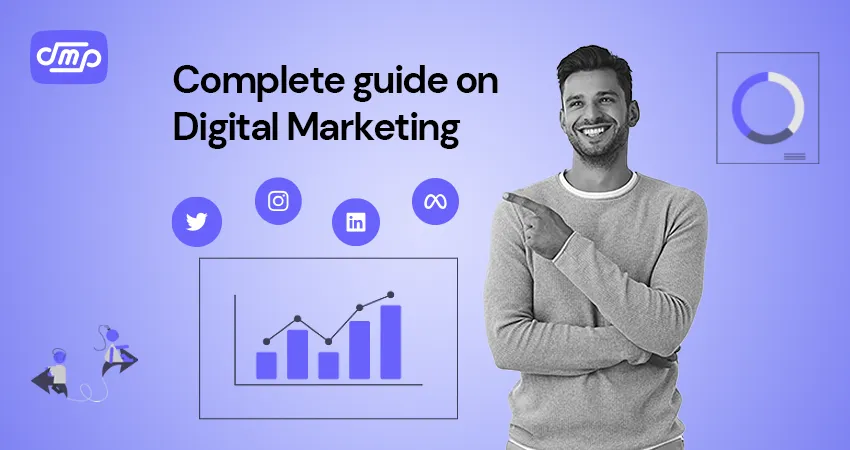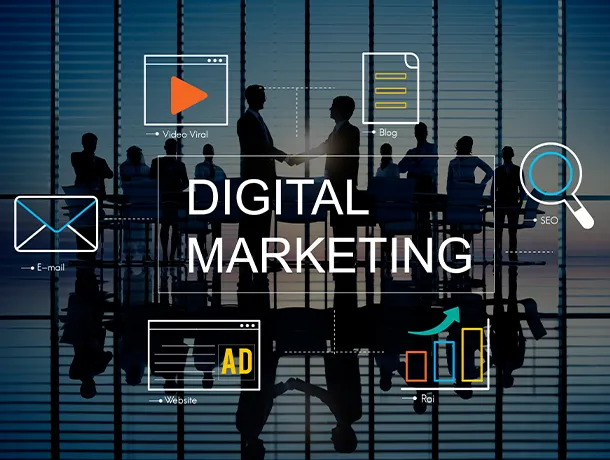
- April 12, 2023
- Digital Marketing
What is Digital Marketing?
Digital marketing is the latest marketing practice of promoting a service, good or brand via digital channels like social networking sites, search engines, email, websites, and mobile apps. It is a type of marketing that reaches and interacts with target consumers by using digital technology and data-driven methods.
Search engine optimization(SEO), Pay-per-click (PPC) advertising, social media marketing, email marketing, content marketing, influencer marketing, and affiliate marketing are just a few of the strategies and tactics used in digital marketing. These strategies are employed to develop customer loyalty, raise brand awareness, increase traffic to a website or landing page, and produce leads and conversions.
Digital marketing’s main benefit is its quick and efficient capacity to reach a large audience. Through digital platforms, firms can precisely target distinct audiences based on their demographics, interests, and habits. This focused strategy may result in higher engagement rates, stronger brand recognition, and higher ROI.
Overall, digital marketing is an essential component of contemporary marketing strategies, and as more companies turn to online platforms, its significance is only anticipated to grow.

Types of Digital Marketing
Digital marketing comes in a variety of forms, including:
- The technique of optimising a website to appear higher on search engine results pages is known as search engine optimisation, or SEO (SERPs). Enhance organic traffic, this entails optimising website content, keywords, and technical components.
- Advertising that is paid for each time a user clicks on an ad that appears on a search engine results page or a social media platform is known as pay-per-click (PPC) advertising. This enables companies to focus on particular audiences or keywords and only pay for clicks that lead to website visits or conversions.
- Using social media sites like Facebook, Twitter, and Instagram to advertise a company or a product is known as social media marketing. This may entail producing and disseminating content, running advertisements, and interacting with followers.
- To draw in and hold the attention of a target audience, valuable and pertinent material must be created and shared. Blog entries, videos, infographics, and ebooks can all fall under this category.
- To advertise a company or a product, targeted emails are sent to a list of subscribers. This can involve drip campaigns, marketing emails, and newsletters.
- Partnering with social media influencers to market a company or product to their following is known as influencer marketing. This can apply to giveaways, sponsored content, and product reviews.
- In affiliate marketing, companies or people work together to promote a product or brand in return for a commission on any sales or clicks that result from their marketing efforts.

What are the advantages of digital marketing?
Digital marketing has a number of benefits, including:
- Expanded Audience: Digital marketing enables companies to communicate with a wider audience via a number of platforms, including social media, search engines, and email. More website traffic leads and conversions may result from this wider reach.
- Increased Targeting: Companies can target particular consumers via digital marketing, depending on demographics, interests, behaviours, and other characteristics. More qualified leads and higher engagement rates may result from this targeting.
- Cost-effectiveness: Compared to conventional marketing strategies like print ads and TV commercials, digital marketing may be more economical. Companies can choose to set their own budgets for each campaign and can pay for clicks, impressions, or conversions.
- Improved ROI: Companies may tailor their plans for optimum ROI by tracking and measuring the outcomes of their digital marketing activities. By examining which strategies are generating the most traffic and conversions, they may modify their budget and targeting.
- Real-time Results: Digital marketing initiatives can yield real-time results, enabling companies to swiftly modify their plans and messaging in response to what is and is not working.
- Improved Engagement: Businesses can interact with their customers through social media, email, and other channels when using digital marketing. Customer satisfaction and brand loyalty may rise as a result of this interaction.

What does a digital marketing agency do?
An organization known as a “digital marketing firm” aids companies in promoting their goods and services online through a variety of digital platforms and strategies. Here are some examples of what a digital marketing company may accomplish:
- Creating a complete digital marketing plan that is in line with a company’s aims and objectives might be assisted by a digital marketing firm.
- To increase a company’s website’s exposure and rating in search results, a digital marketing firm can optimize it for search engines.
- To direct relevant traffic to a company’s website, a digital marketing agency can build and manage PPC campaigns on platforms like Google Ads, Bing Ads, and Facebook Ads.
- Digital marketing companies may manage a company’s social media accounts to provide interesting content, grow a following, and raise brand awareness.
- To market a company’s goods or services and nurture leads, a digital marketing agency can create and carry out email marketing campaigns.
- To draw in and keep the attention of a company’s target audience, a digital marketing agency can create and publish blog posts, infographics, videos, and other sorts of content.
- A digital marketing agency can monitor and evaluate the success of a company’s online advertising efforts and produce reports that demonstrate the return on investment for each channel and strategy.
In general, a digital marketing agency may assist businesses in engaging their target audience.
Traditional marketing v/s digital marketing

Two distinct strategies for promoting goods or services are traditional marketing and digital marketing. Some of the main variations between them are as follows:
- Channels: Although digital marketing employs online channels like social media, search engines, email, and mobile apps to reach and engage target audiences, traditional marketing focuses on offline channels like print, radio, television, billboards, and direct mail to reach potential customers.
- Targeting: While digital marketing enables more accurate targeting by using data and analytics to discover and engage particular market segments, traditional marketing often targets a broader audience with a one-size-fits-all strategy.
- Communication: Digital marketing provides for two-way contact between organizations and customers, helping them to develop relationships with their target audience. This makes it more interactive and engaging than traditional marketing.
- Cost: For small businesses with tight funds, digital marketing can be more cost-effective than traditional marketing. Compared to traditional advertising channels, many digital marketing platforms have cheaper expenses per impression, click, or conversion.
- Measurable: Digital marketing enables real-time campaign performance measurement, enabling companies to monitor the effectiveness of their marketing initiatives and make data-driven decisions. Contrarily, traditional marketing can be challenging to effectively measure, making it more challenging to support the return on marketing spending.
Both traditional marketing and digital marketing have advantages and disadvantages, and the most successful marketing plans incorporate components from both modalities to connect with target consumers and engage them.
Who needs digital marketing?
Nearly any organization may profit from digital marketing in the current digital era. These are some instances of those who can profit from digital marketing:
Small businesses: Using digital marketing to expand their online presence and attract new clients can be an affordable strategy for small businesses.

E-commerce companies: Digital marketing is crucial for e-commerce companies as it may assist enhance website traffic, conversion rates, and client loyalty.

Startups: Using digital marketing to spread the word about their brand, create buzz, and draw in early adopters can be a successful strategy.

B2B businesses: Digital marketing may assist B2B businesses with lead generation, relationship-building, and sales growth.

Non-profits: Digital marketing may be a potent tool for non-profits to spread the word about their mission, draw in donations, and interact with supporters.

Established brands: Even well-known firms may use digital marketing to stay current and keep a step ahead of the competition.

Digital marketing can thus be advantageous for any company looking to connect with and engage with its target audience online. The secret is to create a digital marketing plan that fits your company’s objectives, target market, and resource limitations.
Digital marketing example
Here’s an illustration of how effective digital marketing can be in real life.
Consider that you manage a modest online store where you offer custom-made jewellery. Women between the ages of 25 and 45 who are interested in fashion and accessories are your target market. You want to draw more people to your website, improve sales, and cultivate a devoted following of clients.
You could use the following strategies as part of your digital marketing plan:
- Search engine optimisation (SEO): You make your website optimised for terms associated with handcrafted jewellery, clothing, and accessories so that it ranks better when potential clients type these terms into search engines.
- Pay-per-click (PPC) advertising: Involves creating Google AdWords ads targeting keywords associated with your products and placing bids on those ads to have them appear at the top of search engine results on pages. Besides making commercials, to reach your target demographic, you may also create ads on social media sites like Facebook and Instagram.
- Content marketing: To engage and inform your target audience, use content marketing to produce blog pieces, social media postings, and films that highlight your products and brand’s history.
- Email marketing: Through email marketing, you may increase sales and foster client loyalty by creating a list of subscribers who have chosen to receive updates from your company and sending them newsletters, discounts, and personalized suggestions.
- Social media marketing: Social media marketing entails setting up accounts on websites like Instagram, Pinterest, and Facebook to promote your goods, grow a following, and hold competitions and giveaways to boost user interaction and user-generated content.
Using these strategies will help you develop a comprehensive digital marketing plan that will connect with your target market, increase website traffic, and eventually increase sales and foster client loyalty for your handmade jewellery company.
Conclusion
In general, the kind of digital marketing a company opts for will depend on its objectives, target market, and financial constraints. Businesses can develop a thorough and successful marketing strategy by utilizing a variety of digital marketing strategies. In comparison to traditional marketing strategies, digital marketing has a number of benefits, including higher engagement, cost-effectiveness, increased ROI, and improved reach and targeting. Businesses can develop successful and efficient marketing strategies that provide results by utilising these advantages.
FAQ on digital marketing
Businesses may enhance their online presence, attract a larger audience, and boost consumer engagement and conversions with the aid of web development. Reducing procedures and automating jobs, can also increase business productivity and efficiency.
By offering pre-built modules and plugins, open-source systems (like WordPress, Drupal, and Joomla) can save development costs and accelerate development. Because they are regularly updated and tested by a broad community of developers, they can also increase the security and scalability of websites.
By offering pre-built components and templates and removing the need for human coding, web development frameworks (like React, Angular, and Vue.js) can streamline the development process. They can also make websites more secure, scalable, and easy to maintain while facilitating changes.
By enabling more intricate features and interactions, back-end development can enhance the functionality and performance of websites. Additionally, it can increase the security and scalability of a website, making it simpler to manage large volumes of traffic and user data.











